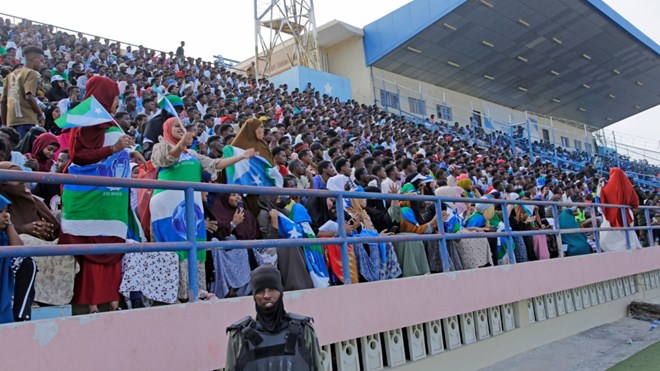Friday January 26, 2024
By Abdi Hafow Mohamed

Fans watch the soccer league match between Hirshabele and Jubaland at a stadium in Mogadishu, Somalia, Tuesday, Jan 23, 2024. Somali authorities have in recent years been working to restore the national stadium in Mogadishu. AP Photo/Farah Abdi Warsameh)
The ongoing inter-state football games in Somalia have sparked a heated debate surrounding the nature of the federal states in Somalia and the influence of tribal allegiances. These discussions have brought to light the complexities faced by Somali youth, who find themselves supporting federal states based on their tribal connections rather than their place of birth or residence. The consequences of such tribalism in football games have highlighted the need to strike a balance between tribal loyalty and fostering unity within the nation.
A friend born and raised in the Waberi District of Mogadishu stated that he preferred the Galmudug state squad to the Banaadir team during a heated debate at a busy tea shop on Taleex Street. He claimed that tribal blood ties are more important than any other affiliations when asked about his allegiance to a state he has never visited. Thousands of Somali teenagers from the Banaadir region, who find themselves supporting federal states other than their birth and upbringing due to tribal ties, find resonance in this friend's viewpoint.
Professor Ozal Varol aptly states that tribes are not inherently harmful, as they provide a sense of community among like-minded individuals. However, tribalism becomes dangerous when it transforms rivals into enemies, suppresses diverse thinking, and influences individuals to act against their own interests. The inter-state football games have attracted spectators who have little interest in the sport but attend matches solely due to their tribal affiliations. Unfortunately, many of these spectators have never watched a football game before and lack a basic understanding of its rules. In a group stage game between Hirshabelle and Banaadir, a controversial offside ruling led to stone-throwing incidents, resulting in injuries to more than four people. Explaining the intricacies of an offside rule to someone watching a football game for the first time is challenging.
The inter-state football games have also raised important questions regarding the nature of federal states in Somalia. Are these truly unified federal states, or are they merely tribal federal states? The formation and structure of these states come under scrutiny as individuals question their allegiances. Can one claim allegiance to two federal states simultaneously? There have been instances where players who failed to secure a spot in the final 23-man selection for one federal state moved to another state in search of representation.
Football has the potential to be a powerful tool for peace-building and social development in post-conflict societies. The joyous celebrations and the record number of fans attending games in Mogadishu Stadium reflect a sense of renewed peace and stability in the city. However, the unfortunate transformation of the game into tribal wars undermines these achievements. The recent attack on the South-West state team bus and their subsequent withdrawal from the tournament have further eroded social cohesion in Somalia, fueling tribal animosity among opposing clans.
Since the tribal wars affected every household in 1990 and their aftermath, we can all expect to see people over 30 years old have a tribal mindset. However, what can influence children born after 2000, who make up most of the youth attending Mogadishu stadium every afternoon, is something else entirely. If we wish to have a new generation that doesn't formulate their sense of belonging based on tribal ties, I believe that the roles of parents, teachers, and the community at large have failed in changing the thinking of these people.
Way forward:
Rotate the Hosting Rights: To promote fairness and inclusivity, the Somali Football Federation should rotate the hosting rights for the inter-state football games across all federal states. While Puntland has already hosted the tournament once, other states should be given the opportunity to host as well. This will not only showcase different regions of Somalia but also help develop local sports infrastructure in preparation for the games.
Promote Education and Awareness: A key aspect of addressing the issue of tribal allegiance overshadowing other connections is education and awareness initiatives targeting Somali youth in schools and universities. Providing comprehensive education that emphasizes the importance of unity, diversity, and the negative consequences of excessive tribalism is essential.
Media and Communication Strategies: Developing effective media and communication strategies is crucial in promoting inclusive narratives and discouraging divisive tribal rhetoric. Media outlets, both traditional and digital, should prioritize responsible journalism. By doing so, the media can play a significant role in fostering unity and promoting a sense of national identity.
Establish a Non-Political Organizing Committee: Put in place a non-political organizing committee composed of representatives from each federal state. This will give ownership of the event to all the member states.
Abdi Hafow Mohamed
Abdi is a social researcher and humanitarian practitioner based in Mogadishu.
[email protected]